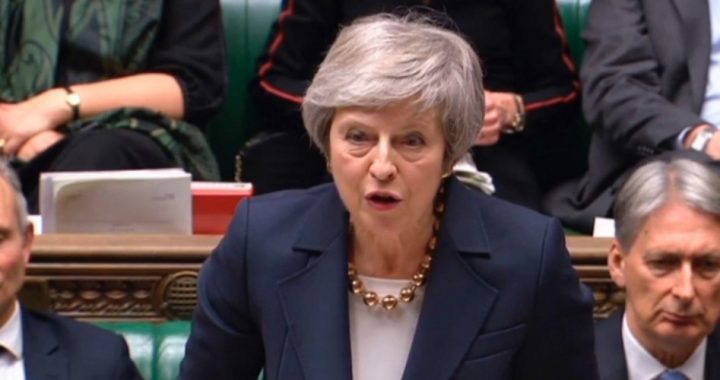
U.K. Prime Minister Theresa May is dismissing calls to postpone the scheduled vote on her Chequers Plan for Brexit on December 11. Cabinet ministers are reportedly imploring the PM to stall for time until a solution on the “Irish Backstop” issue can be hammered out.
The current deal, called a “soft Brexit” by conservative opponents, is widely disliked by both the “leave” and “remain” sides of the debate. More than 100 members of Parliament (MPs) of May’s Tory (Conservative) Party have already announced they would vote against the current deal, making any chance of its passing nearly impossible.
May told the BBC, “We’re in the middle of five days of debate which will lead to a vote on this issue.… They are voting on the deal.”
A key provision of the Chequers Plan, the Irish Backstop, is the main stumbling block with the current deal. Simply explained, it is a fallback plan to ensure that the border between the Republic of Ireland, an EU member, and Northern Ireland, a part of the U.K., remains open as it is now, regardless of how Brexit happens.
When asked by BBC Radio 4 if she was considering a postponement on the vote, May said, “No. What I am doing is leading up to a vote on Tuesday. Yes, I am meeting with colleagues, I’m listening to colleagues’ concerns around the backstop.”
The EU currently maintains a single market and customs union for all member states. This arrangement allows member states to trade freely with one another and ship goods freely across borders. Should the U.K. leave without a deal in place, the concern is that the EU will increase border security between the two Irish states, creating checkpoints and delays at crossing points.
A key member of May’s governing coalition, the Democratic Unionist Party (DUP) of Northern Ireland, is promising to vote “no” on Tuesday, fearing that the deal would isolate Northern Ireland politically and economically from England, Scotland, and Wales. The DUP also strongly opposes any new or increased border checkpoints between the two Irelands.
Earlier this week, May lost three key votes in the House of Commons, one of which prompted the release of legal advice from Attorney General Geoffry Cox about the Chequers Plan. The advice hinted that the Chequers Plan would tie the U.K. to the EU in perpetuity in an unofficial “trade union” of sorts.
From the legal advice: “While it will not be directly bound by EU rules, GB [Great Britain] will be obliged to observe a range of regulatory regulations in certain areas, such as environmental, labour, social and competition laws (the ‘level playing field’), which reflects varying levels of correspondence to EU standards.”
The legal advice further contends that the current deal could trap the U.K. in endless negotiations over the backstop issue. “In the absence of a right of termination, there is a legal risk that the United Kingdom might become subject to protracted and repeated rounds of negotiations,” Cox concluded.
May doesn’t believe the Irish Backstop will necessarily link the U.K. with the EU in a long-term way. “The backstop is not a trick to trap us in the EU,” she said.
“It actually gives us some important benefits of access to the EU’s market without many of the obligations and that is something the EU will not want to let happen, let alone persist for a long time.”
In a last-ditch effort to woo some MPs, May is offering a “parliamentary lock” to MPs, which promises a vote in Parliament before the Irish Backstop could be implemented. May has been hosting face-to-face meetings with groups of MPs in an attempt to sway some voters.
Should a “no” vote happen on Tuesday, which seems likely, several possibilities could occur: 1) The U.K. could leave the EU in late March with no deal, which could lead to some temporary economc chaos as both the EU and the U.K. find their footing; 2) Parliament could debate again on the current plan and hold a second vote; 3) Brexit could be delayed as another deal is negotiated; 4) a vote of no-confidence in May could be issued, which could remove the current government; ) another referendum on Brexit could be ordered.
In regard to Brexit, May has attempted to walk a treacherous middle-of-the-road-path in an attempt to keep everyone happy — and that is impossible. One of the main problems with international entanglements such as the European Union or the United Nations is that once in them, it is extremely difficult to just leave them. Likewise for the United States with NAFTA/USMCA trade agreements.
Photo: AP Images





